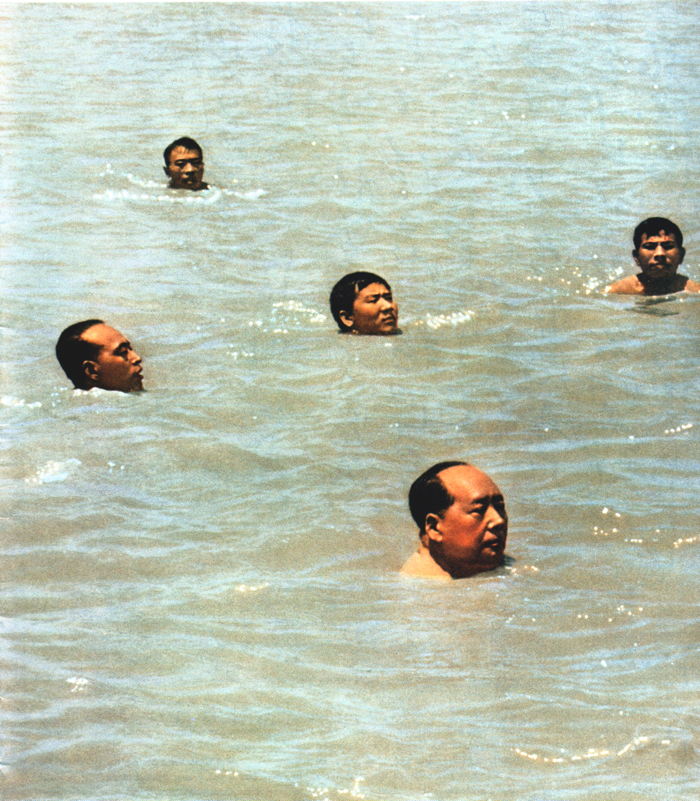










|
|
Power Swim in the Yangtse
Throughout his life, Mao Zedong had been an advocate and
practitioner of physical fitness not only for health reasons, but
also for revolutionary ends. From his youth, he had had a penchant
for swimming, in particular as a kind of ablution as a political
ritual and as an exercise in self-discipline. This predilection
assumed national importance from the mid-1950s onward, when the
Chairman told the People that: "Swimming is a sport in which
the swimmers battle against nature; you should go into the big
rivers and seas to temper yourselves."*
 Fear not fierce wind and waves Fear not fierce wind and waves
I swim as though strolling leisurely in a garden
— Swimming, Mao Zedong
On July 16, 1966, after having spent many months out of public view,
Mao announced his resumption of power by undertaking an 'heroic'
swim of fifteen kilometers (over nine miles) down the Yangtse River,
at the age of seventy-three.
Mao said: "Everyone says the Yangtse is huge. Huge doesn't make it
scary. Isn’t American Imperialism huge too? But we took a jab
at it [during the Korean War], and there was not much to it. So,
there are some big things in this world that are not scary at all."*
In the months prior to Mao’s July 1966 swim, the Cultural
Revolution had been unfolding throughout China, with power struggles
among the leadership and the rise of Red Guards among Chinese youth.
In June, after consulting with Mao who was then in the South, Liu
Shaoqi and Deng Xiaoping sent work teams, or government supervisory
groups, to schools and universities in an attempt to reassert Party
control. These work teams tried to control the rising mass movement
by banning protests and big-character posters against the
authorities.
Mao sat quietly in South China, letting Liu and Deng handle this
very difficult situation, until his Yangtse swim.
What joy it is to struggle with heaven!
What joy it is to struggle with the earth!
What joy it is to struggle with man!
— Mao Zedong, 1919
“On the Founding and Operation of the Society for the
Promotion of Health,” published in
Xiangjiang Review (no. 1, Interim Supplement Issue), 21
July 1919.
New Wave
The Yangtse swim made headlines around the world. In China, this
supposedly Olympian feat of strength and vitality was reported as an
act with both political and quasi-religious significance. Chinese
newspapers were printed in red ink, and newsreels of the event were
shown at movie theaters throughout China.
Mao returned to Beijing two days later where he expressed his
extreme displeasure with the “erroneous leadership”
exercised in his absence by Liu Shaoqi and Deng Xiaoping, warning
that "Anyone who represses a student movement will come to no
good end!" (Comment reportedly made in July 1966, cited in the
People’s Daily, April 24, 1967.) Then, on August 1, 1966, Mao
wrote a letter affirming the right of the Red Guards to “rebel
against all reactionaries.” (“A Letter to the Red Guards
of Tsinghua University Middle School,” 1 August 1966, in
Stuart Schram, editor,
Chairman Mao Talks to the People, Talks and Letters:
1956-1971, New York: Pantheon Books, 1974, pp. 260-261.)
*"Chairman Mao Swims in the Yangtse," China Pictorial,
October 1966.
|